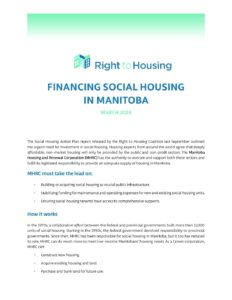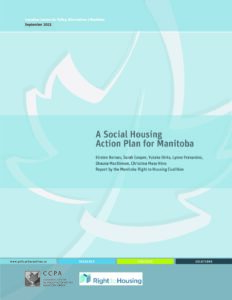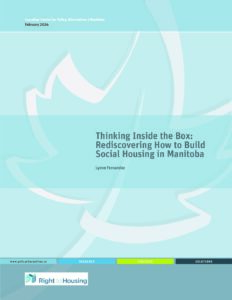Manitoba Social Housing Action Plan
Five pillars to solve Manitoba’s housing crisis
The Right to Housing Coalition has put forward a social housing action plan for Manitoba that pulls together solutions based on decades of research and consultation. The coalition is calling on the Manitoba government to commit to implementing a social housing action plan that features the following five key pillars:

The Right to Housing Coalition has also put forward options for financing the expansion of social housing. These financing options are based on the research presented in Thinking Inside the Box: Rediscovering How to Build Social Housing in Manitoba. The report, released in February 2024, explains how the Manitoba government can relearn the strategies it has successfully used, and still has at hand, to increase the supply of social housing and repair and maintain existing stock. You can read a summary here.
The problem
In Manitoba, thousands of people are unable to find stable housing. The private rental market is increasingly unaffordable to people experiencing poverty and homelessness, exacerbated by rent regulations which allow landlords to hike rents in specific circumstances. Households in the lowest income quartile spend an average of 68% of their incomes on housing. This has escalated the demand for non-market, social housing where rents are capped at 30% of a household’s income.
Nearly 6,000 households are on the waitlist for a social housing unit. With nowhere else to go, many people end up staying with friends/family, in shelters, or outside. According to the 2022 street census, there are more than 1,200 people experiencing homelessness on any given night in Winnipeg alone.
All levels of government must do what is necessary to address the housing crisis. This means reinvesting in social housing and putting an end to the failed 30-year-old experiment of relying almost exclusively on the private market to produce low-rent housing.

Current Campaigns
Learn more about the campaigns we are running to urge the Manitoba government to implement solutions to the housing and homelessness crisis that are rooted in our social housing action plan:





